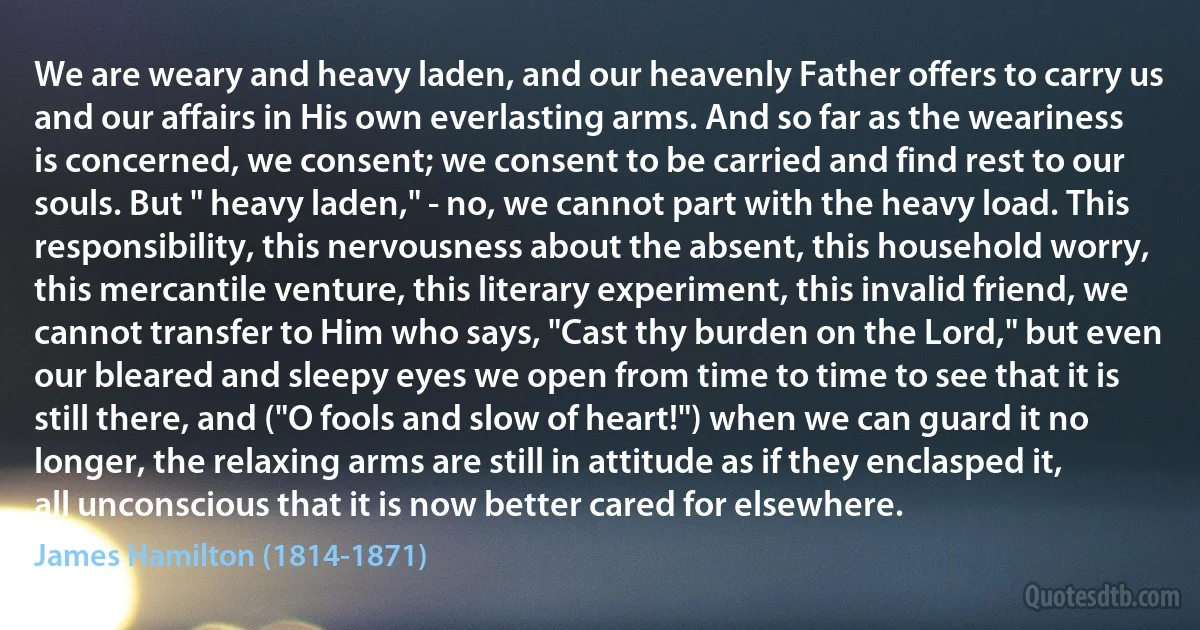
We are weary and heavy laden, and our heavenly Father offers to carry us and our affairs in His own everlasting arms. And so far as the weariness is concerned, we consent; we consent to be carried and find rest to our souls. But " heavy laden," - no, we cannot part with the heavy load. This responsibility, this nervousness about the absent, this household worry, this mercantile venture, this literary experiment, this invalid friend, we cannot transfer to Him who says, "Cast thy burden on the Lord," but even our bleared and sleepy eyes we open from time to time to see that it is still there, and ("O fools and slow of heart!") when we can guard it no longer, the relaxing arms are still in attitude as if they enclasped it, all unconscious that it is now better cared for elsewhere.
James Hamilton (1814-1871)Related topics
absent arms burden carry cast consent elsewhere experiment far father find friend guard heart heavy load longer lord nervousness now open relaxing rest see slow time transfer unconscious venture worry affairs eyesRelated quotes
"Thy sun," says Isaiah to Jerusalem, " shall no more go down, neither shall thy moon withdraw itself; for the Lord shall be thine everlasting light, and the days of thy mourning shall be ended. Thy people also shall be all righteous; they shall inherit the land forever." Such is the type of a free people.
Our northern ancestors worshipped this tri-une Deity; Odin, the Almighty Father; Frea, his wife, emblem of universal matter; and Thor, his son, the mediator. But above all these was the Supreme God, "the author of everything that existeth, the Eternal, the Ancient, the Living and Awful Being, the Searcher into concealed things, the Being that never changeth." In the Temple of Eleusis (a sanctuary lighted only by a window in the roof, and representing the universe), the images of the Sun, Moon, and Mercury, were represented.

Albert Pike
I'm aware of the made up declarations about me that have recently begun to appear on the Internet and in emails as "Chuck Norris facts." I've seen some of them. Some are funny. Some are pretty far out. Being more a student of the Wild West than the wild world of the Internet, I'm not quite sure what to make of it. It's quite surprising. I do know that boys will be boys, and I neither take offense nor take these things too seriously. Who knows, maybe these made up one-liners will prompt young people to seek out the real facts as found in my recent autobiographical book, "Against All Odds?" They may even be interested enough to check out my novels set in the Old West, "The Justice Riders," released this month. I'm very proud of these literary efforts.

Chuck Norris
For what advantage is it, that the world enjoys profound peace, if thou art at war with thyself? This then is the peace we should keep. If we have it, nothing from without will be able to harm us. And to this end the public peace contributes no little: whence it is said, ‘That we may lead a quiet and peaceable life.' But if any one is disturbed when there is quiet, he is a miserable creature. Seest thou that He speaks of this peace which I call the third (inner, ed.) kind? Therefore when he has said, ‘that we may lead a quiet and peaceable life,' he does not stop there, but adds ‘in all godliness and honesty.' But we cannot live in godliness and honesty, unless that peace be established. For when curious reasonings disturb our faith, what peace is there? or when spirits of uncleanness, what peace is there?

John Chrysostom
WHAT HAPPENS AFTER DEATH?
When a human soul goes out of the body, some great mystery happens. For if it is guilty of sins, then there come hordes of demons, evil angels and dark forces, take that soul and drag it to their side.
No one should be surprised at that, because if a man surrendered and fell prey to them while still alive in this world, will not they have even greater control over him and enslave him when he departs from this world?
As for the other, the better part of people, something different happens to them. There are Angels around the holy servants of God in this life; the holy spirits surround them and protect them; and when their souls are separated from the body, the choir of Angels welcomes them into their fellowship, into a bright life, and thus leads them to the Lord.

Macarius of Egypt
The attempt made to establish a separate and independent Confederation has failed; but the consciousness of having done your duty faithfully, and to the end, will, in some measure, repay for the hardships you have undergone. In bidding you farewell, rest assured that you carry with you my best wishes for your future welfare and happiness. Without, in any way, referring to the merits of the Cause in which we have been engaged, your courage and determination, as exhibited on many hard-fought fields, has elicited the respect and admiration of friend and foe. And I now cheerfully and gratefully acknowledge my indebtedness to the officers and men of my command whose zeal, fidelity and unflinching bravery have been the great source of my past success in arms.

Nathan Bedford Forrest
